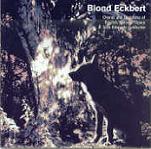This 65-minute opera by English composer Judith Weir premiered in 1994 in London; it was shown in Santa Fe soon after. Weir studied composition with John Tavener, but I have opted not to hold that against her. There is only one moment–and a very effective moment, indeed–in this opera that reminds us of the excruciating Tavener: a spooky, wordless interjection by the chorus meant to give the jitters in this nerve-racking, eerie tale.
The opera, based on a folk tale/horror story (you judge) by Ludwig Tieck, concerns Egbert and Berthe, who live peacefully and uneventfully in a rural setting in the Harz mountains. Eckbert’s friend Walther comes to visit; at first he seems gloomy, then congenial. Berthe tells Walther her life story: she was abused as a young girl and escaped to an isolated area where an old woman took her in and brought her up; their only companions were a magic bird that laid jewels instead of eggs and a dog whose name Berthe cannot recall; she eventually tied up the dog, let the bird go free after stealing its jewels, and left to search for her parents, whom she found had died; she later married Eckbert and they’ve lived off the money from the jewels.
Walther, entertained and grateful, mentions the dog’s name. Both Berthe and Eckbert are properly distressed by this and Eckbert becomes paranoid. The scene changes and Eckbert, hunting in the forest, fires an arrow and kills Walther. Berthe has become ill since Walther upset her, and she is near death. Eckbert, half mad with concern, visits a nearby city (it is here that the Tavener-like wordless chorus enters hauntingly), where he meets a stranger named Hugo, who soon reminds him too much of Walther. Eckbert runs, and soon finds himself in the area Berthe described where the old woman lived; there he sees another stranger who looks like Walther. He hears the singing of the bird.
When he meets the old woman, she tells him that she, Walther, and Hugo are the same person and that Berthe was, in fact, his sister, who was given away when she was very young. Eckbert realizes that he always suspected it, and the woman says that he heard his father mention it when he was a little boy. Eckbert falls to the ground, insane and dying, as the bird–who incidentally has been a present narrator all along–flies away.
What does it all mean? Well, it doesn’t matter. Maybe it’s about isolation or the inability to escape one’s past, or both or neither. Whatever, the mood is set, the story moves quickly, and the effect is nice and chilling. Is Eckbert paranoid, as he acts? Or is his and Berthe’s life being turned upside down by a demonic force? Again, it’s just as good not knowing as it would be knowing.
The opera is in two acts. The first moments, in an unsettled key, present small phrases that while hardly comfortable are not dissonant, and the act has a folksy, conversational way about it (the vocal lines are as honest as Janácek’s), with Berthe’s story a long narrative and the bird’s music pretty. Hints of soft xylophone and harps played pizzicato–always softly–are nervous-making, but not very.
The second act, in which Eckbert gets crazier and crazier, is darker, more in-your-face, with the wordless chorus particularly disturbing. Like the story itself, which is a hallucinatory tale told in a conventional, conversational manner, the music is never grotesque, but it’s always odd and jumpy. Weir’s use of the orchestra is flavorful and it’s never used to shock. There’s something nicely minimalist about the frequent short phrases that are repeated. The opera seems to have no pretense, and it’s all the more powerful for that.
The singing and playing are excellent, with tenor Christopher Ventris doing particularly well as Walther, Hugo, and the Old Woman, and Anne-Marie Owens’ fine mezzo used without guile in Berthe’s story. Sian Edwards leads with an ear for impressionism. This is a fascinating, fat-free work, highly recommended. [2/2/2006]
































